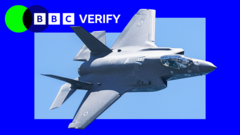In a significant diplomatic move, Iranian officials convened with their European counterparts from the UK, Germany, and France for renewed discussions centered around Iran's nuclear ambitions. This meeting, held at Iran's consulate in Istanbul, marks the first engagement since a series of Israeli attacks on Iran's nuclear facilities instigated a brief yet intense military conflict in June, leading to US military strikes on Iranian sites and abruptly halting previous negotiations.
Iran Reengages in Nuclear Talks with European Powers Amid Rising Tensions

Iran Reengages in Nuclear Talks with European Powers Amid Rising Tensions
Diplomatic discussions are underway as Iran meets with UK, Germany, and France to discuss urgent nuclear program negotiations.
The E3 nations—comprising the UK, Germany, and France—issued a stern warning to Iran, threatening to reinstate punitive sanctions if substantial advancements in negotiations are not achieved by the end of August. Kazem Gharibabadi, Iran's Deputy Foreign Minister, emphasized the depth of the discussions, describing them as "serious, frank, and detailed," and confirmed an intention to continue dialogues.
Gharibabadi also criticized the potential reimposition of sanctions as "completely illegal," pointing out that these measures were previously lifted under the 2015 Iran nuclear deal, which sought to curb Iran's nuclear capabilities in exchange for relief from economic sanctions. This agreement involved critical stakeholders including the US, UK, France, China, Russia, and Germany. However, tensions escalated following the US's withdrawal from the deal in 2018 under President Trump, leading to the reinstatement of sanctions and Iran's subsequent violation of the agreement's terms.
As talks began, the director general of the International Atomic Energy Agency (IAEA), Rafael Grossi, stated that Iran has expressed a willingness to reopen discussions at a technical level about its nuclear activities, emphasizing the need for transparency. Concurrently, Iranian spokesperson Esmaeil Baghaei criticized the E3 for their past "unconstructive policies," asserting that they should utilize these talks to mend prior disagreements stemming from their alignment with US and Israeli military actions.
In response to rising tensions, Iran's parliament previously suspended cooperation with the UN nuclear oversight body, leading to an escalated cycle of military actions. Following the Israeli strikes on June 13, Iran retaliated with missile and drone operations. The situation has seen the US providing a limited reprieve for diplomatic engagement in a bid to reduce hostilities, yet military operations—such as the controversial "Operation Midnight Hammer" by the US—continued, with mixed assessments regarding their effectiveness in stifling Iran's nuclear program.
As diplomatic efforts progress, the future of Iran's nuclear potential hangs in the balance, with the international community closely monitoring developments in an already volatile region.
Gharibabadi also criticized the potential reimposition of sanctions as "completely illegal," pointing out that these measures were previously lifted under the 2015 Iran nuclear deal, which sought to curb Iran's nuclear capabilities in exchange for relief from economic sanctions. This agreement involved critical stakeholders including the US, UK, France, China, Russia, and Germany. However, tensions escalated following the US's withdrawal from the deal in 2018 under President Trump, leading to the reinstatement of sanctions and Iran's subsequent violation of the agreement's terms.
As talks began, the director general of the International Atomic Energy Agency (IAEA), Rafael Grossi, stated that Iran has expressed a willingness to reopen discussions at a technical level about its nuclear activities, emphasizing the need for transparency. Concurrently, Iranian spokesperson Esmaeil Baghaei criticized the E3 for their past "unconstructive policies," asserting that they should utilize these talks to mend prior disagreements stemming from their alignment with US and Israeli military actions.
In response to rising tensions, Iran's parliament previously suspended cooperation with the UN nuclear oversight body, leading to an escalated cycle of military actions. Following the Israeli strikes on June 13, Iran retaliated with missile and drone operations. The situation has seen the US providing a limited reprieve for diplomatic engagement in a bid to reduce hostilities, yet military operations—such as the controversial "Operation Midnight Hammer" by the US—continued, with mixed assessments regarding their effectiveness in stifling Iran's nuclear program.
As diplomatic efforts progress, the future of Iran's nuclear potential hangs in the balance, with the international community closely monitoring developments in an already volatile region.



















